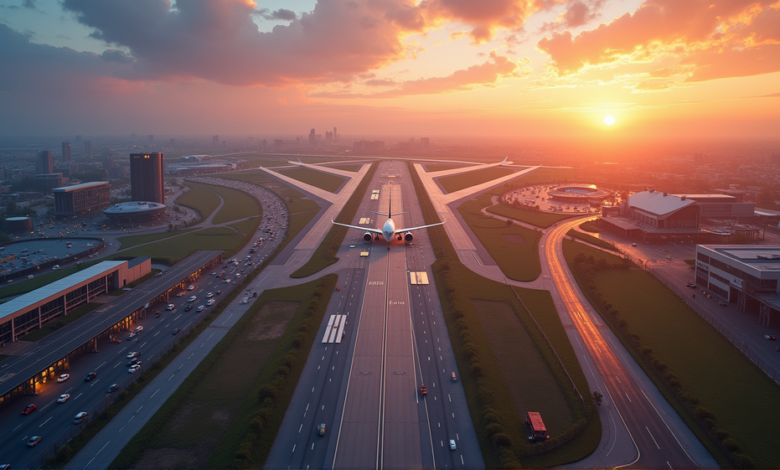
- Knowledge is power
- The Future Of Possible
- Hibs and Ross County fans on final
- Tip of the day: That man again
- Hibs and Ross County fans on final
- Spieth in danger of missing cut
Introduction
London’s Heathrow Airport, the busiest airport in the UK and one of the largest global aviation hubs, has announced a multi-billion-pound expansion plan aimed at increasing passenger capacity, upgrading infrastructure, and modernizing facilities to meet growing air travel demands. This privately funded initiative is set to reinforce Heathrow’s position as a leading international gateway, while also laying the groundwork for a potential third runway—a long-debated proposal that could significantly enhance UK connectivity, investment, and economic growth.
Key Expansion Plans
The expansion project primarily focuses on enhancing Terminals 2 and 5, while also considering broader infrastructure upgrades to accommodate increasing air traffic. The plans include:
1. Expansion of Terminal 5
- Increase in aircraft stands to handle more flights.
- Expanded departure and arrivals capacity to ease congestion.
- Enhanced baggage handling and passenger movement systems for smoother travel experiences.
2. Upgrades to Terminal 2
- Improved airline connectivity, allowing more long-haul and short-haul flights.
- New passenger-friendly check-in areas, security lanes, and lounge spaces.
- Expanded retail and dining facilities for a world-class airport experience.
3. Third Runway: A Step Closer?
- Heathrow has long sought to build a third runway, a controversial proposal that has faced legal, environmental, and financial hurdles.
- The new expansion plan is seen as a step toward this development, as increased capacity will be needed to support rising passenger traffic.
- If approved, the third runway could handle an estimated 740,000 flights annually, compared to the current cap of 480,000 flights.
Economic Impact of Heathrow’s Expansion
1. Boosting UK Investment & Trade
- Heathrow is a critical hub for global trade, handling 40% of the UK’s air cargo.
- The expansion is expected to create thousands of new jobs and attract foreign investments.
- With improved capacity, the airport can support growing trade routes, particularly with Asia and North America.
2. Enhancing Tourism & Business Travel
- The upgrades will make Heathrow more competitive with other major European hubs like Amsterdam Schiphol, Paris Charles de Gaulle, and Frankfurt Airport.
- Business travelers will benefit from increased flight frequencies and improved connections.
- Tourism is expected to grow, with Heathrow playing a key role in bringing visitors to the UK.
3. Strengthening Regional UK Airports
- Heathrow’s expansion is part of a larger UK-wide aviation infrastructure upgrade, with major renovations also planned at London Stansted, Bristol, and Manchester airports.
- These improvements will enhance domestic connectivity, ensuring regional UK airports benefit from increased Heathrow capacity.
Challenges & Controversies
1. Environmental Concerns
- Climate activists and environmental groups argue that expanding Heathrow contradicts the UK’s net-zero commitments.
- Increased flights will lead to higher carbon emissions and potential air pollution issues in surrounding communities.
- Heathrow has pledged to invest in Sustainable Aviation Fuel (SAF), carbon offset programs, and eco-friendly airport operations, but critics remain skeptical.
2. Increased Costs for Passengers
- Higher landing fees for airlines could translate into more expensive airfares.
- Heathrow is already one of the world’s most expensive airports for carriers, and further cost hikes could deter some airlines from expanding services.
- Budget airlines like Ryanair and easyJet have opposed Heathrow’s expansion, arguing it would drive up ticket prices.
3. Government & Regulatory Approvals
- The UK Government and regulatory bodies must approve the expansion plan before construction can begin.
- A full proposal submission is expected this summer, after which public consultations and legal reviews will take place.
- Chancellor Rachel Reeves has expressed support, but there is political debate about whether a third runway should move forward.
Sustainability & Future-Ready Infrastructure
1. Sustainable Aviation Initiatives
- Heathrow has committed to achieving net-zero aviation emissions by 2050.
- Investments in Sustainable Aviation Fuel (SAF) and electric ground transport will play a key role in reducing the airport’s environmental impact.
- Plans include solar panel installations, waste reduction programs, and carbon offset initiatives.
2. Smart Airport Technology
- The expansion will incorporate AI-driven security checks, biometric boarding, and automated baggage handling.
- A real-time air traffic management system will improve efficiency, reducing flight delays and fuel consumption.
3. Passenger Experience Enhancements
- New self-service kiosks, contactless check-in, and AI-powered customer support will improve the traveler experience.
- Increased lounges, duty-free shopping, and dining options will make Heathrow a global benchmark for premium airport services.
Conclusion: A Transformational Project for UK Aviation
Heathrow Airport’s multi-billion-pound expansion plan is a game-changer for UK aviation, positioning the airport as a future-ready global hub. If approved, this project will: ✔ Boost the UK economy through trade and investment.
✔ Improve connectivity for international travelers and regional airports.
✔ Create jobs and modernize infrastructure for the next generation of air travel.
However, environmental concerns, passenger cost increases, and regulatory approvals remain critical challenges. The future of Heathrow’s third runway and its sustainability strategy will be closely watched as the project progresses.
